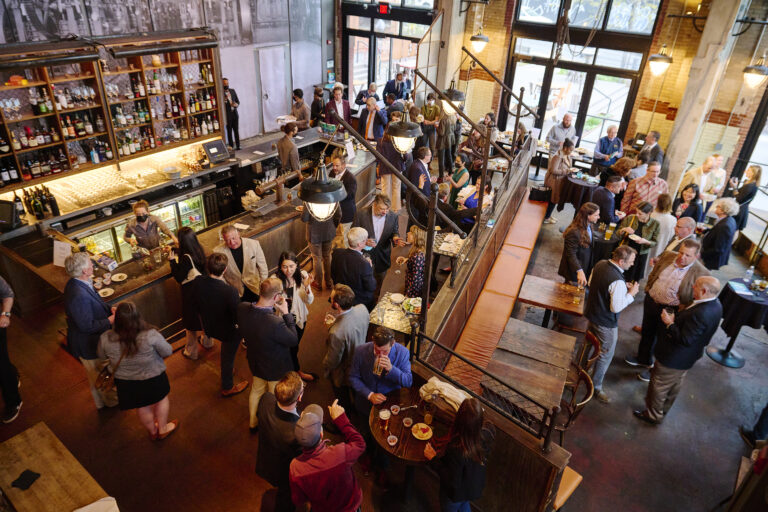The Sustainable Business Network of Greater Philadelphia (SBN) is pleased to announce the sessions being presented at the Achieving Climate Resilience Through Water Symposium on March 20!
Please see below for session titles, leads, and a brief summary of the content that will be presented at the symposium. Full descriptions will be provided to registrants in advance of the event.
Attendees will have three tracks with twelve sessions in total to choose from being led by content experts, leaders in their fields, and government officials about a range of topics from inter-municipal collaboration and stormwater utilities to innovative technologies and approaches to addressing water challenges to novel financing pathways and techniques. PDH credits will also be provided for attendees of sessions for Pennsylvania and New Jersey professionals, provided by JMT.
Tickets are available now starting at $100 for non-profit & government employees, $130 for SBN & GSI Partners members, and $165 for General Admission. We invite you to join us and to get a glimpse of our agenda by exploring the sessions and tracks detailed below.
Please see below a list of the sessions that have been planned for this year’s symposium. Individuals interested in learning more about these topics should get in touch with Alex Cupo at alex(at)sbnphiladelphia(dot)org.
Opening Plenary: “Meeting Urban Stormwater Resiliency and Water Quality Challenges via Cross-Sectoral Collaborations”
Speakers: Pinar Balci, PhD, NYC Water Lead & Deputy East Water Lead, WSP; Biswarup Guha, MS PE CPM, Research Scientist, NJDEP; Marc Cammarata, Deputy Water Commissioner, PWD; Caleb Stratton, Assistant Business Administrator & Chief Resiliency Officer, City of Hoboken, NJ
Session Time: 9:20 – 10:20 AM
Description: Join this Symposium-opening panel presentation on urban resilience as the panelists present groundbreaking strategies for combating urban flooding and water quality challenges in NJ, NY, and PA with state and local government stakeholders. Discover how blue-green infrastructure not only safeguards communities but also brings co-benefits like cleaner air and improved water quality, all while fostering cross sectoral collaborations and innovative solutions to tackle climate change head-on. This plenary also promises to explore lessons learned and best practices, shaping a sustainable and resilient future for urban environments.
Track 1: Green Stormwater Management: New Approaches, Operations & Maintenance
Leveraging Ecological Restoration for Green Stormwater Management
Speaker: Tyler Charles, PE, Water Resources Engineer, JMT
Session Time: 10:30 – 11:15 AM
Description: This session will highlight an innovative stormwater management technique that integrates stream and floodplain restoration, addressing historical impacts and enhancing ecological uplift. Learn about a nature-based design philosophy that not only restores stream corridors but also manages stormwater runoff from land development, and the triple bottom line benefits of establishing stormwater utilities, including flood reduction, water quality improvement, and infrastructure protection, through compelling case studies showcasing the successful implementation of this innovative approach. Join this session for a compelling examination of green stormwater management.
Municipal Stormwater Retrofits: The unique planning, design, construction, budgeting and maintenance challenges
Speaker: Rob Woodman, PE, CPESC, NGICP, LEED Green Associate, Director, Engineering & Green Stormwater Infrastructure, Ferguson
Session Time: 11:20 – 12:20 PM
Description: As towns and cities across the country seek to implement green stormwater infrastructure (GSI) retrofit projects there are a series of unique challenges that differ from managing wet weather on private site development projects. Understanding and addressing these challenges will improve the outcomes, impact, and cost effectiveness of these projects. Dive into the practical challenges of GSI retrofit projects in towns and cities across the country. This presentation offers guidance for designers and program managers, along with case studies, to enhance understanding and improve the outcomes of these projects, and will encourage listeners to adapt their processes to account for the many challenges and to work collaboratively to improve GSI retrofit outcomes.
Circular Soils: Waste-Based Materials for Green Infrastructure Soils
Speakers: Ed Confair, PE, PLA, CPRP, Vice President and Principal of Landscape & Resiliency, E&LP; Megan Schmidt, Project Engineer, E&LP; Rebecca Popowsky, Research Associate, OLIN Labs; Rebecca Davies, Co-Founder, Remark Glass
Session Time: 1:40 – 2:40 PM
Description: Can engineered soils, designed for green stormwater infrastructure (GSI), include recycled pulverized glass rather than virgin sand to simultaneously reduce reliance on environmentally damaging materials and provide a sustainable outlet for a major waste stream? Join this session on the Circular Soils initiative, an innovative approach to green stormwater infrastructure using recycled pulverized glass instead of traditional sand. Learn how this practice-based research project, backed by US EPA funding, is transforming urban landscapes, creating sustainable soil, blends, and propelling us towards a greener, circular economy.
Stormwater Utility: A Mechanism for Funding Green Stormwater Infrastructure Projects in Your Community
Speakers: Dana Patterson, Director of Marketing & Communications, Princeton Hydro & Elizabeth Treadway, Senior Vice President, WSP
Session Time: 2:45 – 3:45 PM
Description: Stormwater utilities can be a game-changing funding mechanism for building green stormwater infrastructure projects. Join this session to consider real-world examples of successful stormwater utilities and engagement tools for community discussions, as well as to gain insights into the tools needed to enhance resilience against climate impacts in your municipality. The session will address the tools necessary to establish a strategy to encourage, regulate, implement, and oversee the use of green infrastructure in public projects and in new or redevelopment efforts.
Track 2: Stormwater & Climate Resilience Regulatory Frameworks & Policies
The Checkbox is Square One: Leveraging Creativity and Site Synergies to Move Beyond Regulatory Frameworks
Speakers: José Almiñana PLA, FASLA, SITES AP, LEED AP, Principal, Andropogon Associates & Jason Curtis, PLA, LFA, SITES AP, LEED AP, Senior Associate, Andropogon Associates
Session Time: 10:30 – 11:30 AM
Description: Globally, and particularly within the design professions, climate change is placing a spotlight on the changing patterns of the water cycle and the roles that carefully-designed buildings and landscapes play in preserving healthy sites and mitigating the damage to ecosystems and infrastructure. As legal regulations have become the default mechanism for green stormwater infrastructure strategies, this session explores how going beyond those regulations satisfy and surpass benchmarks through alternative methods that save time in construction, cost less, and reduce the need for development space and building systems. This session will detail creative strategies used on projects at the Northern District of Mississippi as well as at Yale Divinity School. In recognizing these creative solutions and progress made in this field, what’s needed now is creativity and holistic thinking to help the industry push forward and define new metrics for the success of the built environment.
Radnor Township’s Green Infrastructure Approach to Water Quality and Flood Reduction
Speakers: Michele Adams, PE, LEED AP, Founder, Meliora Design; Marc Henderson, PE, Project Manager, Senior Water Resources Engineer, Meliora Design; Michael Busch, EIT, Civil and Water Resources Engineer, Meliora Design
Session Time: 11:35 – 12:20 PM
Description: Radnor Township, situated in the headwaters of the Darby Creek Watershed in Pennsylvania, grapples with urban flooding exacerbated by climate change and undersized infrastructure. Despite not aligning with FEMA-mapped flood areas, Radnor initiated a watershed-based Green Stormwater Infrastructure (GSI) strategy in 2018, focusing on frequent, intense rainfalls and completing a regional project in 2023 to reduce flooding and enhance water quality, with a second major project underway featuring wooded wetlands restoration funded by Growing Greener and NFWF.
Hydrating the Learning Landscape
Speakers: Sara Pevaroff Schuh, RLA, ASLA, Principal, SALT Design Studio; Le (Cindy) Xu, RLA, LEED BC+D AP, Landscape Architect, SALT Design Studio; James Gallagher, EIT, Senior Engineer, Rodriguez Consulting; Emma Melvin, Green Infrastructure Program Manager, The School District of Philadelphia
Session Time: 1:40 – 2:40 PM
Description: Explore the transformative role of urban school districts in managing stormwater and promoting community greening. Join our discussion on the School District of Philadelphia’s pioneering green stormwater infrastructure projects, revealing how these initiatives not only mitigate pollution but also enhance water quality, foster environmental equity, and provide unique learning opportunities for students, contributing to climate resilience.
Tapping into Community Knowledge and Building Trust: Strategies to Bring Equity to Stormwater Management, Resilience, and Adaptation Efforts
Speaker: Campbell Simmons, Resilient Communities & Policy Associate, River Network
Session Time: 2:45 – 3:45 PM
Description: Delve into the critical intersection of climate resilience, equity, and community engagement with this session. Through an examination of practical tools, “Building Blocks of Trust” and “Community-Led Research,” developed by River Network, participants will learn how to foster authentic relationships between stormwater utilities, GSI practitioners, and community organizations. Attendees will learn how these tools contribute to equitable stormwater solutions, sharing valuable insights and case studies to enhance understanding and collaboration in the face of climate change.
Track 3: Funding and Financing Opportunities for Water Infrastructure & Community Greening
Owner Engagement and Funding – Lessons from 10 years of GCCW Participation
Speakers: Dennis Shelly, PE, Founder & Managing Member, PEER Environmental; Lyle Winklerprins, Environmental Engineer, PEER Environmental; Maurice Sampson II, Eastern Pennsylvania Director, Clean Water Action
Session Time: 10:30 – 11:45 AM
Description: As Philadelphia navigates the midpoint of its ambitious 25-year Green City Clean Waters plan, challenges arise in capturing an additional 6,725 green acres, necessitating innovative strategies beyond the success of grant incentive-driven projects. Join this exploration of a practitioner’s insights into private sector contributions, barriers for property owners, and potential policies to maintain the promise of greening the city through stormwater infrastructure, in a presentation that dives into the complexities and future directions of GCCW.
Introducing Stormwater Management to Philadelphia C-PACE
Speakers: Carla Windt, PE, CFM, LEED AP ND, Engineering Supervisor, Philadelphia Water Department; Matthew Stern, Senior Director of Commercial Programs, Philadelphia Energy Authority
Session Time: 11:50 – 12:30 PM
Description: During a time of innovation and infrastructure funding, an effort is underway to reshape funding mechanisms for stormwater management as Philadelphia pioneers an expansion of the C-PACE program to include voluntary stormwater practices. A cross-sectoral collaboration between the Philadelphia Energy Authority and the Philadelphia Water Department has led to legislative amendments that now make resiliency projects, including voluntary stormwater management, eligible for C-PACE financing. Learn how this financing tool could make a significant difference in advancing the region’s green infrastructure and the steps that it took to get there.
Inter-municipal Collaboration for Stormwater Management: Case Studies Across Pennsylvania
Speakers: Emerson O’Donnell, Program Manager, WaterNow Alliance; Beth Uhler, Pennsylvania Director, Center for Watershed Protection; Jennifer Cotting, Director, University of Maryland Environmental Finance Center; Lisa Werder-Brown, Executive Director, Watersheds of South Pittsburgh
Session Time: 1:40 – 2:40 PM
Description: Efforts to manage stormwater management for improved water quality and reduced flooding can be complicated by the fact that stormwater fails to respect municipal boundaries. This session will provide a roadmap of strategies and best practices employed by experts and community representatives for collaboration between small and disadvantaged communities and neighboring municipalities to create opportunities to share costs and resources, gain a competitive advantage in funding applications, and pursue shared regulatory goals. Challenges likely arise from any collaboration, including issues of trust, political and financial influence, and alignment of goals and priorities. A case study of success in addressing these challenges and reinvigorating a multi-municipal planning process for stormwater management in Allegheny County, Pennsylvania will be presented with input from experts and community representatives.
Navigating Green Infrastructure Maintenance with Capitalized Establishment Costs
Speakers: Emerson O’Donnell, Program Manager, WaterNow Alliance; Peter Hill, Senior Policy Advisor, Environmental Policy Innovation Center (EPIC); Caleb Stratton, Assistant Business Administrator & Chief Resiliency Officer, City of Hoboken, NJ
Session Time: 2:45 – 3:45 PM
Description: This session will discuss how to maximize the potential of green infrastructure (GI) in stormwater management to make a substantial impact in communities by addressing the funding barrier hindering its scalability. Join this session for an in-depth exploration of a groundbreaking approach from Hoboken, New Jersey, where the establishment periods for GI projects were treated as capital costs, unlocking access to significant financing options and providing actionable recommendations for decision-makers aiming to incorporate this strategy into their projects.




